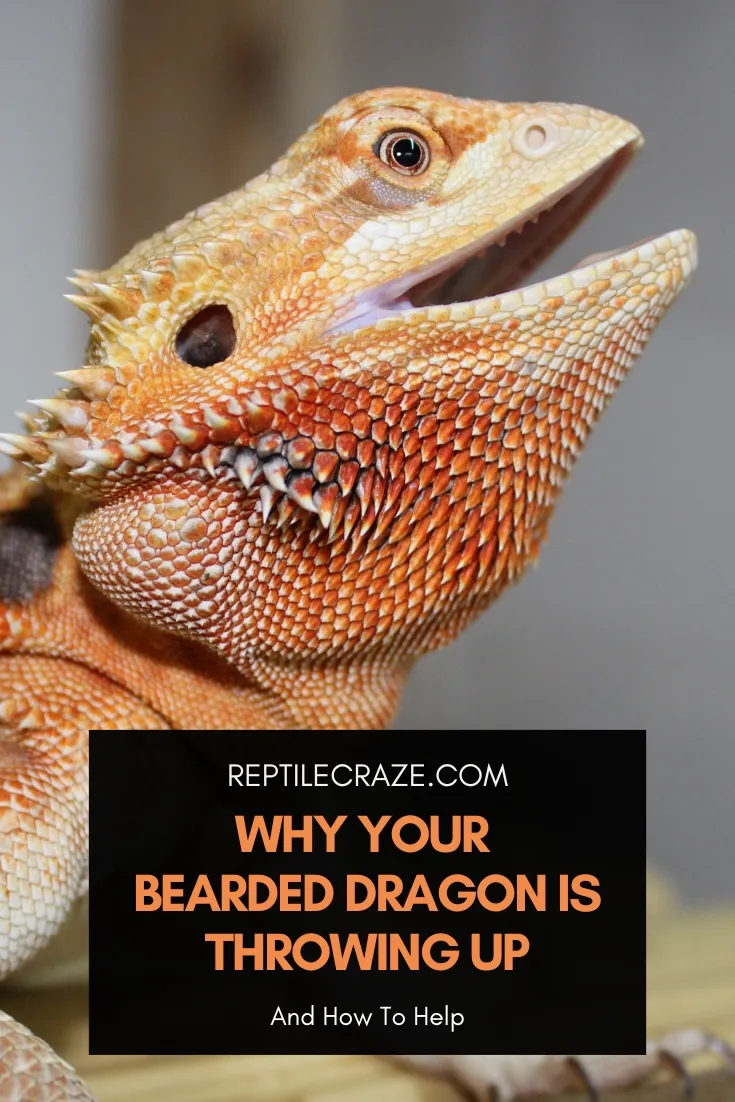
When they’re not feeling well, bearded dragons can vomit just like we humans do. Vomiting is an attempt to remove possible harmful stomach contents to help protect an organism from disease. But what actually causes beardies to throw up? And what should pet parents do if their bearded dragon is throwing up?
Bearded dragons usually throw up if they eat or drink too much too quickly. Other reasons can be impaction, parasites, or infectious diseases. If the vomit contains blood or mucus, or if impaction is suspected, bearded dragons should be taken to a reptile veterinarian immediately.
In this article, we’ll go through the reasons why a bearded dragon can vomit. We’ll also talk about what its appearance can tell you and what to do if your bearded dragon is throwing up.
Table of Contents
Is It Normal For a Bearded Dragon To Throw Up?
A healthy bearded dragon is unlikely to throw up. If they eat a suitable diet, have an enclosure that meets all their requirements, and are free from infection, bearded dragons won’t be sick.
‘Vomiting is uncommon in reptiles, but it is usually caused by gastric disorders. Reptiles that are diagnosed with ingestion of toxic plants, gastritis, gastric ulceration, foreign bodies or gastric neoplasia may vomit’ (source)
A bearded dragon who’s throwing up needs investigating to find the possible cause. There are a variety of reasons for a beardie to throw up, and we’ll talk about them in the later sections.
What Does a Bearded Dragon Throwing Up Look Like?
A bearded dragon throwing up looks similar to any other animal. However, it could be hard to differentiate vomiting from regurgitation.
Compared to throwing up, regurgitation isn’t usually associated with gastrointestinal disease. Causes of regurgitation could be:
- Overeating – a sign of this is if your beardie’s meal comes up soon after eating with little signs of digestion. It could be that your beardie had been overfed or eaten too quickly.
- Drinking too much or too quickly – this could happen if your beardie has recently been in water (bearded dragons like to drink their bathwater!) and will probably just look watery or slimy.
We’ve included a video of a poor beardie throwing up below, so you can watch it in case you’re not sure what it looks like.
Why Is My Bearded Dragon Throwing Up?
Now we know what a beardie throwing up looks like and how it’s different from a beardie regurgitating, let’s explore the reasons why bearded dragons throw up.
Infectious Diseases
Diseases and their associated syndromes caused by microorganisms such as viruses or bacteria can cause your beardie to vomit. Examples of disease-causing microorganisms include:
- Adenovirus – primarily affecting the liver but could cause secondary throwing up
- Salmonella
Zoonotic risk: It’s good to know that bearded dragons can be sources of infections for humans too. Always wash your thoroughly before and after you have any kind of contact with your bearded dragon or their enclosure.
Tumors
One study reported vomiting in the case of a stomach tumor in young bearded dragons. In the case of 10 beardies with the same type of tumor (neuroendocrine carcinoma) the following additional symptoms were seen:
- loss of appetite
- high blood sugar
- anemia (decreased number of red blood cells)
Don’t worry. In the same study, it was noted that ‘neoplastic diseases are relatively uncommon in reptiles compared with other animals and have infrequently been reported in bearded dragons’. (source).
It’s pretty unlikely that your beardie has a tumor if vomiting is their only symptom. However, if you notice a combination of these symptoms in your bearded dragon, contact a specialized reptile veterinarian for further investigation as soon as possible.
Impaction
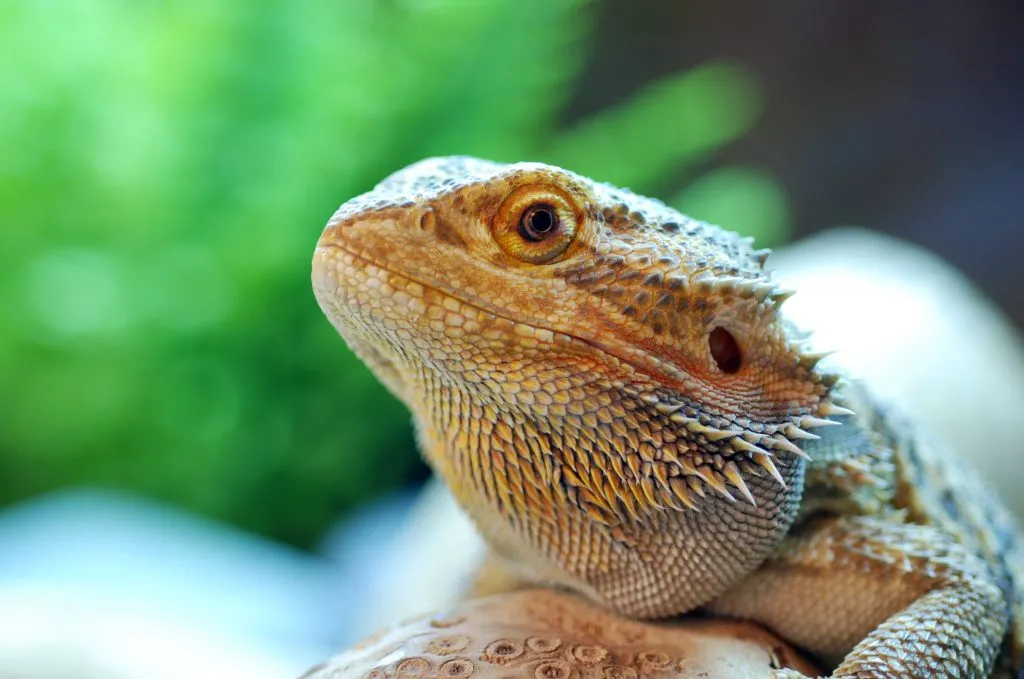
Impaction in beardies is sadly fairly common. It can be a result of ingesting inappropriately sized
It can also be associated with large numbers of intestinal parasites.
In addition to vomiting, signs of impaction in bearded dragons include:
- Swollen belly
- Difficulty pooping
- Loss of appetite
- Acting more tired or slow than usually
If you suspect that your beardie is suffering from an impaction, take them to a specialist reptile veterinarian immediately. Impaction is a life-threatening condition and needs treatment as soon as possible.
You can read more about plants that are suitable for use in a beardie’s enclosure in our article ’21 Edible Plants For Bearded Dragon Enclosures’.
Environmental Parameters
Parameters in your beardie’s environment help them to perform physiologic processes such as nutrient metabolism and digestion.
Temperature and lighting are especially important. Since beardies are ectotherms, they rely on the outside temperature to adjust their internal body temperature. Too low temperature or humidity can mean that a beardie is unable to digest their
Pro tip: whenever you notice something abnormal with your bearded dragon, be sure to check all the parameters in their enclosure such as light, temperature and humidity.
You can learn more about an appropriate environment for bearded dragons to live in through our article ‘Bearded Dragon Care Guide: Diet, Housing, Facts’.
Undigested Food
If their internal body temperature is too low, beardies can have trouble digesting their
In this case, the vomited material will probably look pretty similar to how their
Bearded dragons are more likely to vomit material that is harder for them to digest, such as mealworms with their tough exoskeleton.
To help your beardie get the most out of their meal, always ensure the enclosure conditions are optimal.
Gastrointestinal Ulcers
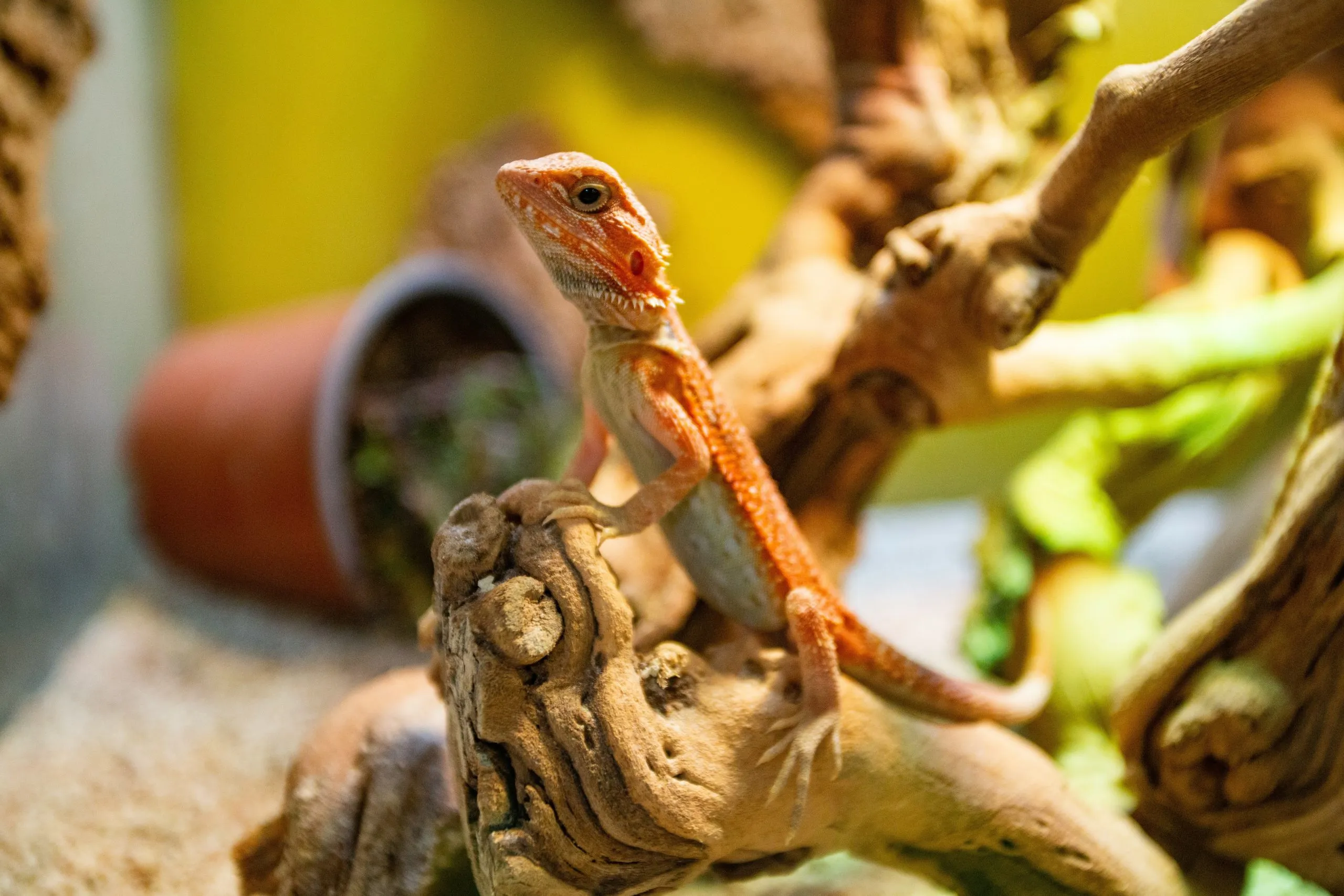
You may have heard of humans suffering from gastric (stomach) ulcers, especially those related to stress. Interestingly, bearded dragons can also succumb to stomach ulceration.
Vets don’t know much about stomach ulcers in beardies, but it’s thought they could have an association with stomach worms or stress.
Ingestion Of Foreign Bodies
If your beardie likes to eat objects which aren’t their
Typical foreign bodies beardies like to ingest include substrate (loose sand is not an appropriate substrate for bearded dragons), plants, and rocks in their enclosure.
Ingestion of foreign bodies is dangerous because it can block (causing impaction) or even damage your beardie’s gastrointestinal system and is life-threatening.
If you suspect your bearded dragon has eaten something it shouldn’t, take them to a specialist reptile veterinarian as soon as possible.
Dehydration
Similar to humans, bearded dragons can feel nauseous or throw up when they’re dehydrated. Always make sure your beardie has access to clean, fresh water.
It’s also good to mist them (outside the cage) and treat them to a soak in the bath occasionally.
Parasites
It’s thought that protozoal parasites such as coccidia can cause gastrointestinal-related symptoms such as vomiting, diarrhea and weight loss (source).
Parasite infections in bearded dragons need treatment with medication from by a veterinarian.
Parasitological infection can be in connection with other infections, such as salmonella. If you think your beardie may have parasites or a bacterial infection such as salmonella, talk to a herp vet.
Specific Types Of Bearded Dragon Vomit
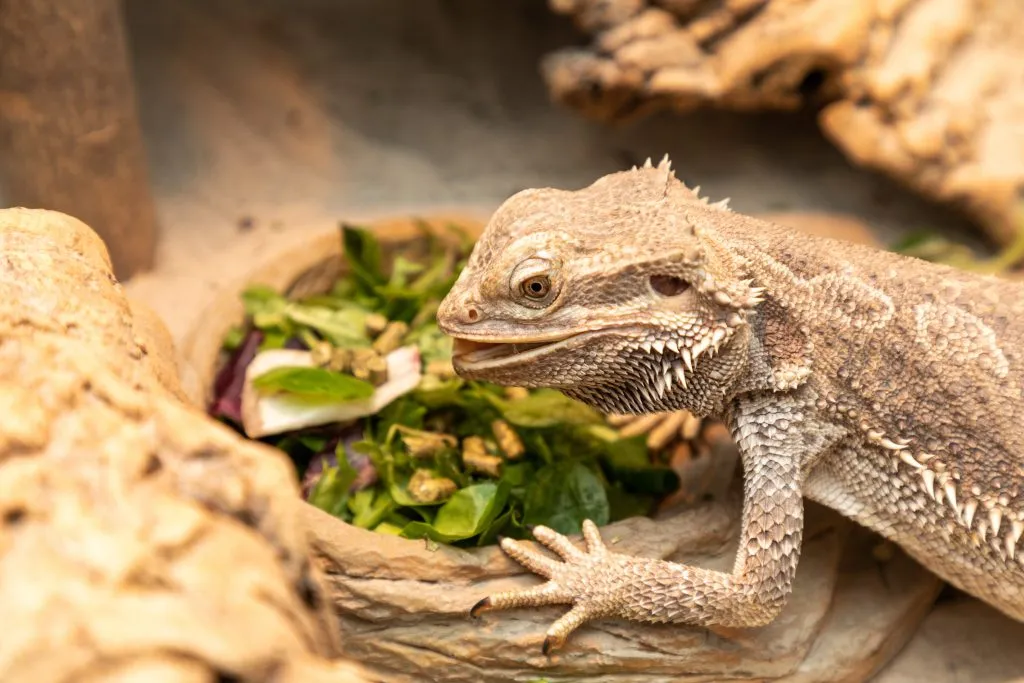
It may be pretty gross, but the appearance of your beardie’s vomit, can give you a clue as to what is causing it. Below, we’ve listed some typical appearances of beardie vomit and what it could suggest:
- Undigested
food such as mealworms, and crickets – if happening immediately after mealtime, it could be that your beardie just ate too fast. - Clear liquid – similar to above, perhaps your beardie drank too much or too quickly.
- Blood – blood in vomit (which can look like coffee grounds) or in the feces is never a good sign. Be sure to take your beardie to a specialist reptile veterinarian.
- Mucus – this could be a sign of an infectious disease, take your beardie to a specialist reptile veterinarian.
Disclaimer: Please refer to the above as a guide only. If your bearded dragon is vomiting for more than one day, accompanied by other symptoms or with blood or mucus in the vomit, take them to a specialist reptile veterinarian immediately.
Poop Vs. Vomit
If you didn’t actually see your beardie being sick, and you just see some material in their enclosure, it could be hard to differentiate it from their feces (especially if they have diarrhea too).
Generally, content that has come from the stomach can smell slightly acidic (from the digestive juices) and will be more solid.
As your beardie’s
If you’re still not sure whether something is your beardie’s vomit or their poop, monitor them closely to see if you can catch them in the act!
Pro tip: if you can, take a photo or a video of your bearded dragon being sick in case you need to show it to your reptile veterinarian later to help with diagnosis.
Why Is My Bearded Dragon Dry Heaving?
Dry heaving looks similar to vomiting or regurgitation, but in the case of dry heaving, no material will exit your beardie’s mouth.
This could be because they have already completely emptied the contents of their stomach or for another reason, such as a respiratory problem.
What To Do After a Bearded Dragon Throws Up?
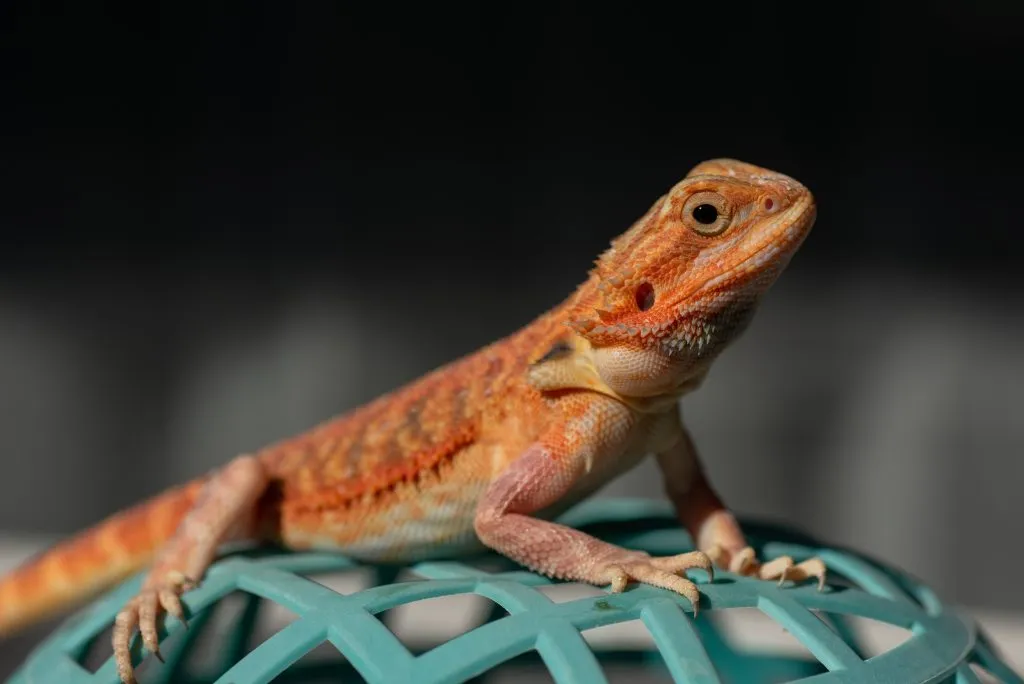
If you notice your beardie throwing up, try to think about a possible cause depending on the circumstances.
If you think that your beardie just ate or drank too quickly, then next time try to make sure they do it more slowly.
As we discussed, another reason for vomiting in bearded dragons could be something to do with their enclosure parameters.
It’s good practice to regularly monitor parameters such as temperature, humidity and light in your beardie’s enclosure.
If you notice that the parameters aren’t appropriate, correct them immediately and wait to see if there is any improvement.
If you saw blood or mucus in the vomit, or your beardie has been throwing up for more than one day, your pet needs an examination from a reptile specialist veterinarian.
If you suspect that your beardie is vomiting due to the following reasons, take them to a specialist reptile veterinarian immediately:
- Ingestion of a foreign body (such as substrate)
- Infectious disease or tumors
- Impaction
Pro tip – if you can, bring a sample of your beardie’s vomit and or feces with you to the consultation with a reptile veterinarian. They will probably want to perform tests on it to look for possible causes. If you can’t see a veterinarian straight away after taking the sample, store it in an air-tight container in the fridge.
In addition to a clinical examination, your veterinarian will perform some diagnostic procedures such as blood, vomit, or fecal analysis to determine why your beardie is vomiting.
After that, they will begin with specific treatment for the cause (if needed). Examples of possible treatments include:
- Supplementation with minerals or vitamins
- Giving fluid to re-hyrdrate them and correct any electrolyte imbalances
- Antibiotics
- Pain medication
- Hospitalization and intensive care (if your beardie is very sick and requires round-the-clock veterinary care)
You can read more about health problems in bearded dragons in our article ‘8 Signs Your Bearded Dragon Is Dying’.
Conclusion: Why Is My Bearded Dragon Throwing Up?
There are a few reasons why your beardie may throw up, with some of them being more serious than others. Luckily, most of the causes of throwing up in beardies are preventable by proper care and husbandry.
Have you had an interesting experience with a beardie throwing up? Tell us about it in the comments below!
- Enchi Ball Python: A Unique and Stunning Morph of Python regius - March 27, 2025
- Emerald Tree Monitor: The Enigmatic Green Guardian of the Rainforest - March 26, 2025
- The Egyptian Cobra (Naja haje): A Fascinating Serpent - March 25, 2025
